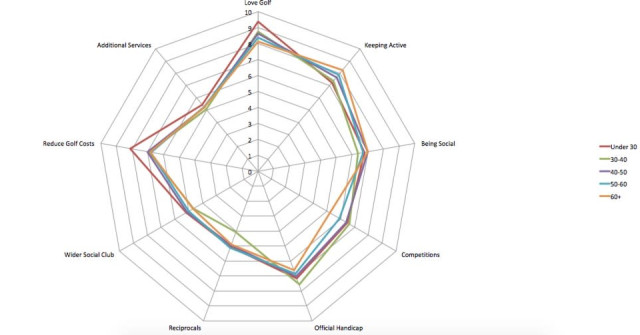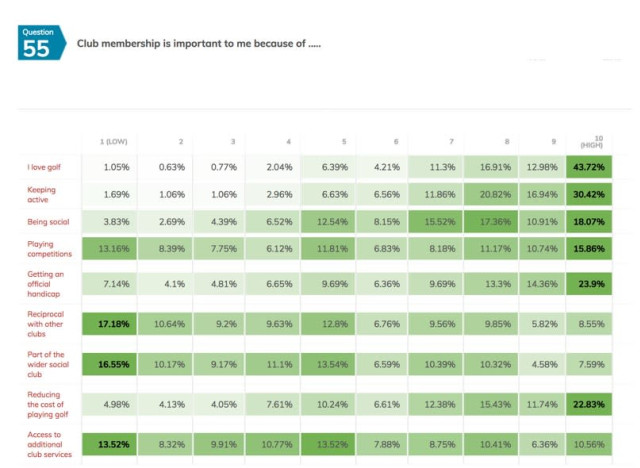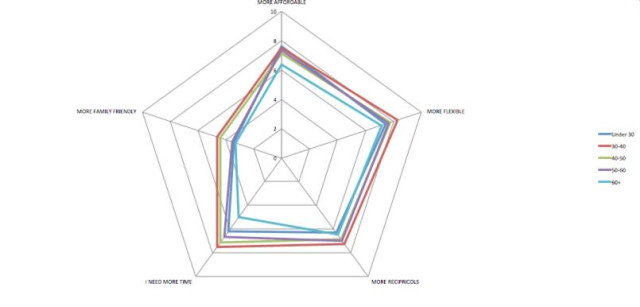
How to Increase Golf Club Memberships
The eternal question facing golf clubs is how they can attract new members. It’s a complicated and multi-faceted subject, but perhaps the answer can be found in understanding what current members value most from their memberships, and what dissuades others from joining. The solution may be somewhere in the middle. Reflecting on the differences between club and nomadic golfers is key, a topic we explored in this previous article, but taking that a step further, we delved into the thousands of responses to the 2018 Golfshake Survey to ask: How to Increase Club Memberships?
Strikingly, there was a near 50-50 split between golf club members and those without affiliation among the survey respondents, providing a strong base of information for analysis. Asking club members why their membership was important to them, passionate younger golfers (under 30) cited it as a way to reducing the cost of playing, while collectively golfers under 50 stated that competitions and retaining an official handicap was a major factor in having a membership.
Club membership is important to me because of .....

Featured Content
For older golfers, those in their 50s and beyond, keeping active and the social side of the game were more relevant pluses, which doesn’t come as a great surprise, underlining that memberships are arguably naturally attractive to those of a middle-aged demographic, something that doesn’t necessarily have to be viewed as a negative providing there is growth in that group and new or returning middle-aged and senior players are continually drawn to golf clubs.
When it comes to new members – of any age – the cost benefits, social aspect and additional services are important for those just starting out, whereas the more experienced, longer established golfers view the competitive side and handicaps as being the main attraction of memberships, something that likely crosses over with the age of the player, but may suggest a line of marketing that could be adopted for when it comes to attracting fresh members to a club.

Those are the reasons cited by current golf club members for why they hold a membership, but what about those golfers who are presently unaffiliated? For many, it’s an arrangement that they are comfortable with, 59% of non-club golfers responded to say that they prefer to be a casual golfer, but there are 16% who are interested in joining a club. Combine that group with the 22% who have dropped their memberships due to cost or time, and you have potentially 40% of non-club golfers who could be temped to join venues either as a returning member or for the first time. There is certainly room for growth.
In the survey, we asked: “I would become a golf club member if…” and it won’t come as a shock that the main barriers cited by non-club golfers were cost, time and flexibility, particularly for those aged between 30 and 50, who also noted that more family friendly environments would be desirable. Affordability is a factor for all groups aside from senior golfers, who likely have more disposable income for recreation, but intriguingly younger players most cited reciprocal options as being something they would value, suggesting that they want the opportunity to play more than one course.
I would become a golf club member if…

Many golf clubs have already experimented with flexible memberships, whether it be weekend or midweek options, but more innovation in that area is evidently required with the demand for greater flexibility in the face of time pressures. There are potentially 40% of non-club golfers who would like to be a member, so making that possibility more open and accessible has to be at the forefront in the approach of golf clubs when it comes to marketing and outlining membership categories, whereas for older golfers, the social and healthy living factors should be promoted heavily.
Ultimately, those with memberships value that situation, which is a positive, and there’s a significant chunk of golfers who prefer being nomadic. There is certainly room for both in the game, but that floating demographic of non-club members is the group that provides an opportunity for clubs to target new and returning golfers to proudly adopt their venue as their home of golf.
20 Reasons to Join a Golf Club?
Why Don't Golfers Join Golf Clubs?
Survey Highlights Opportunities for Golf Clubs to Increase Revenue
Tags: Survey industry insider









